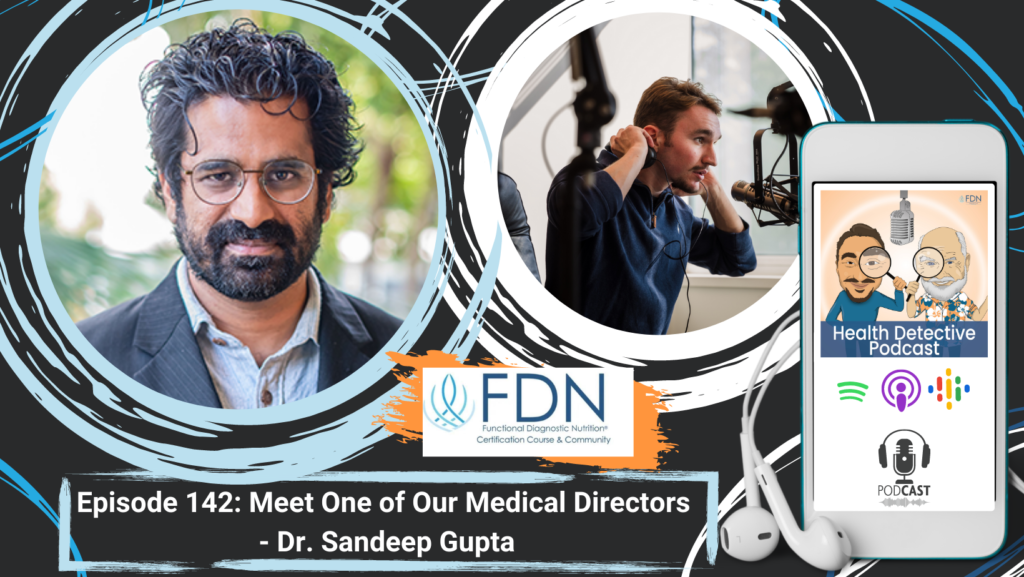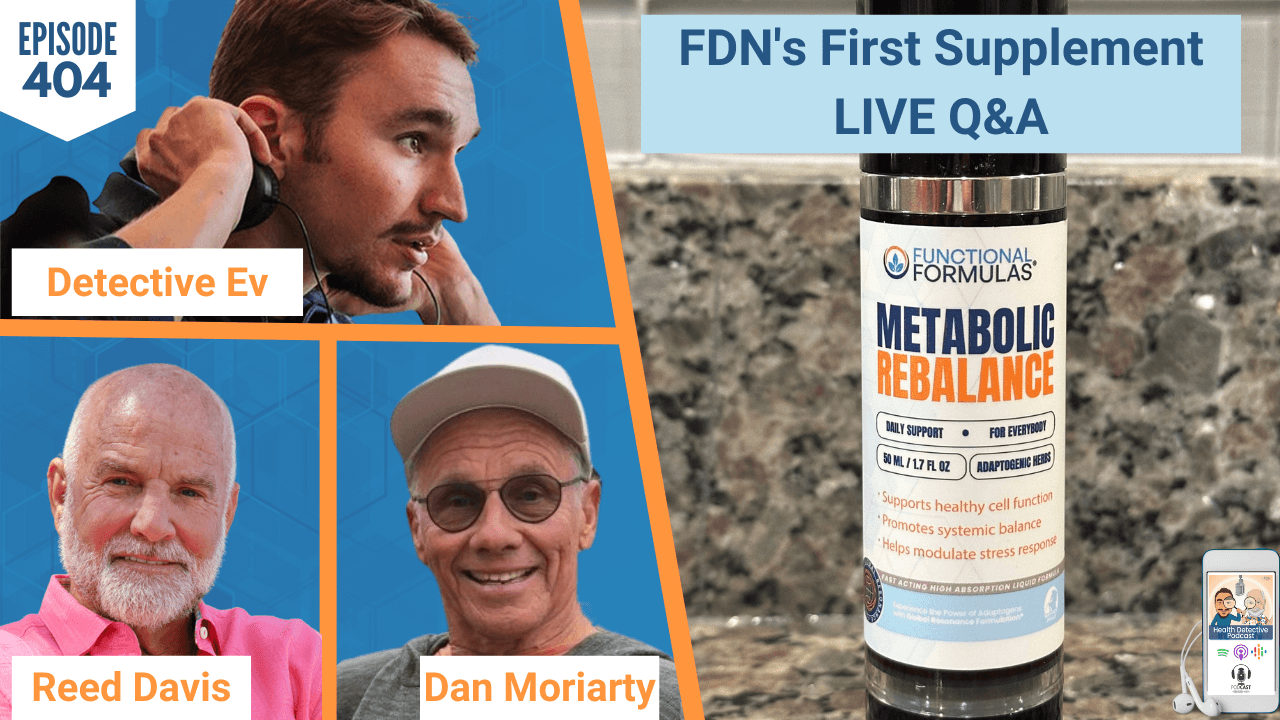Introduction
[00:00:00] Detective Ev: What is going on my friends and welcome back to another episode of the Health Detective Podcast by Functional Diagnostic Nutrition. My name is Evan Transue, AKA Detective Ev. I will be your host for today’s show in which we have a pretty special guest with us. His name is Dr. Sandeep Gupta. The reason he is such a special guest is because he is our first medical director who has ever been on this podcast.
At the FDN course, once you graduate, you are allowed to facilitate lab orders through our doctors. People are always pretty confused about this. They ask, how can I facilitate a lab order if I’m not licensed myself, or if I don’t have a degree in this specifically?
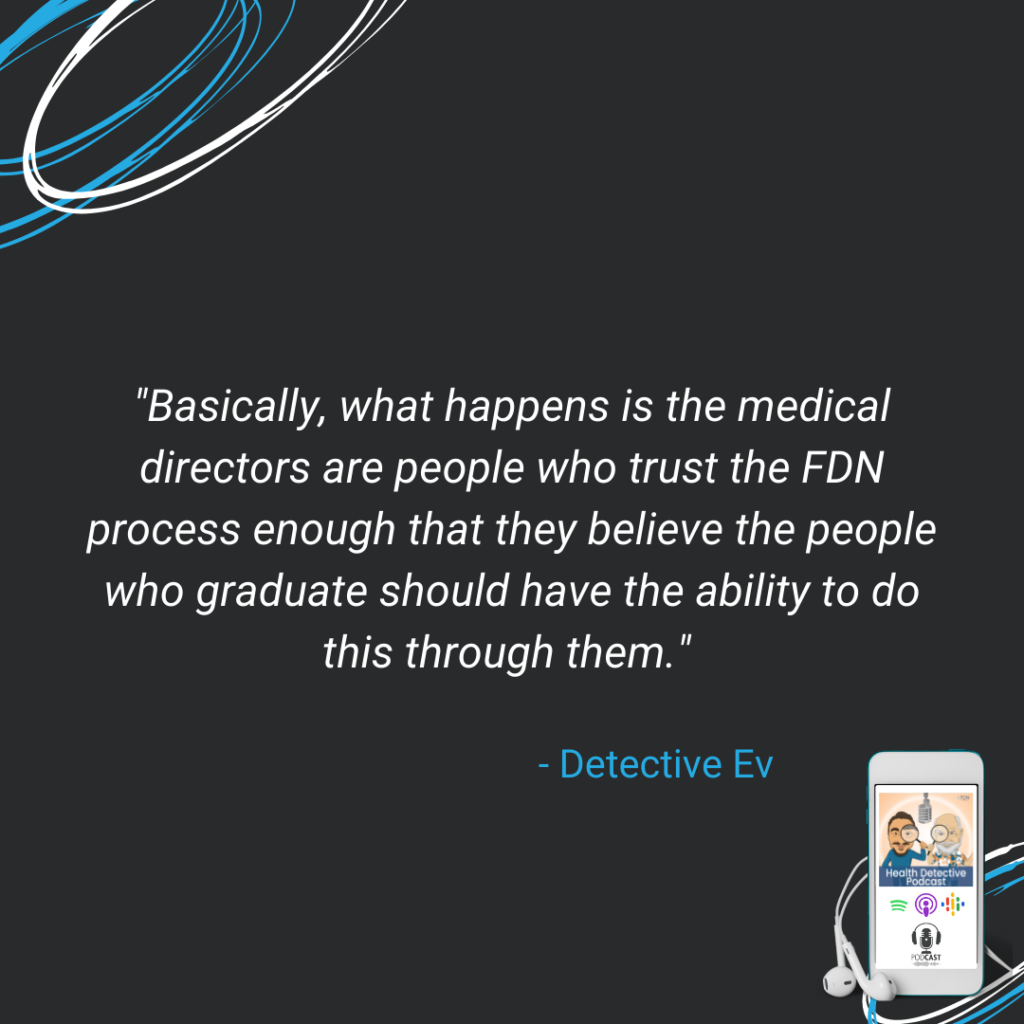
I do these things myself. I have no relevant college degrees for this, and I’m able to facilitate lab orders. I have been able to do this for five years. Basically, what happens is the medical directors are people who trust the FDN process enough that they believe the people who graduate should have the ability to do this through them.
The doctor is actually ordering the test for your client, the client runs the test on themselves, and we give you all the paperwork, everything that you need. They are signing off on you analyzing the results and giving them a protocol based on this. Which of course there’s training for all of that.
That’s not what the entire podcast is about because as you’ll find, this guy that we’re talking to today had his own health story, like so many of us. But he was at one point a traditional doctor. He was actually working in emergency rooms for a while. We’ll talk about all of that in the show.
About Dr. Sandeep Gupta
I want to give you a little background on him before we get started. Dr. Gupta is a vocationally registered general practitioner who runs an integrative medicine clinic on the Sunshine Coast, which is in Australia, for those of you that don’t know. I did not know that. His main passion relates to finding the underlying causes and innovated approaches to managing chronic illness
Dr. Gupta graduated from medical school at the University of Queensland in 1999. He has received specialized training in integrative medicine and was awarded a Fellowship of the Australasian College of Nutritional and Environmental Medicine in 2008 and a Fellowship of the Australian College of General Practitioners in 2010.
I know that you guys like my random facts. I did not know what Australasia incorporated. That is Australia, New Zealand, and neighboring islands. Has nothing to do with health, but you get to learn something else today.
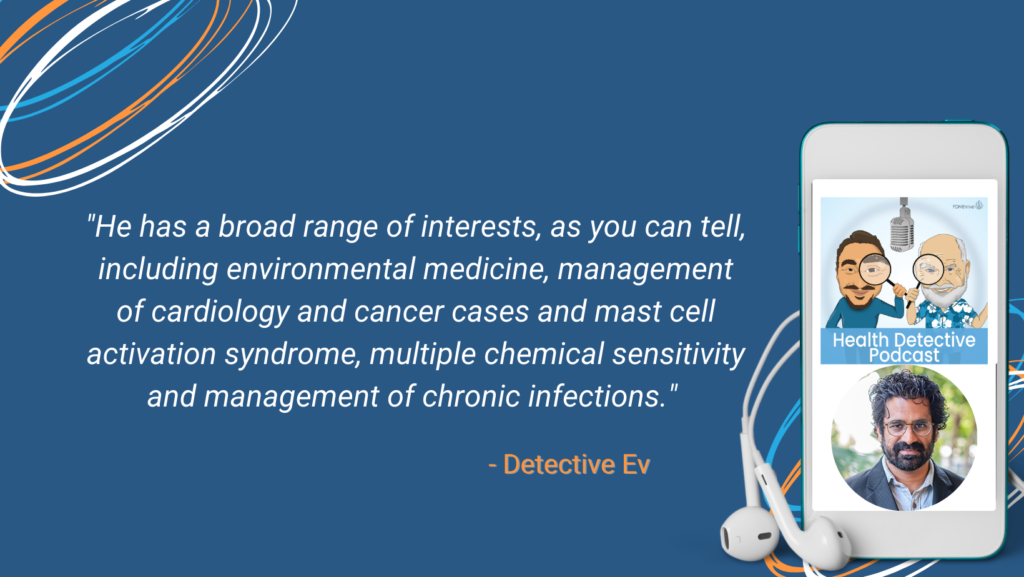
He also has a physician training certification with Dr. Ritchie Shoemaker in biotoxin illness and a Masters of Nutrition with Dr. Gabriel Cousens in diabetes and living food nutrition. He is currently a board member of the Australian Chronic Infectious & Inflammatory Disease Society (ACIIDS), and also the International Society for Environmentally Acquired Illness (ISEAI). He has a broad range of interests, as you can tell, including environmental medicine, management of cardiology and cancer cases and mast cell activation syndrome, multiple chemical sensitivity and management of chronic infections.
As you can clearly tell this is obviously one of our less intelligent guests on the show.
So, without further ado, let’s get to the episode.
FDN Graduates Access Labs Through Our Medical Director Program
Hey there, Dr. Gupta. Thanks so much for being here with us today.
[00:03:04] Dr. Sandeep Gupta: Hey Evan. Thanks for having me.
[00:03:04] Detective Ev: I’m excited to talk to you.
This actually ended up working out really well. We had tried to schedule with Dr. Gupta before. We could not be farther away. He is all the way in Australia. I’m on the east coast of the United States. It’s not a fun scheduling thing. So, I appreciate you very much coming on at seven something in the morning for us here. That’s dedication to FDN.

For those that are regular listeners, we’re not going to get into this first thing in the podcast, but this is a special episode for you guys. Many of you ask, that are not doctors, although we do have plenty of doctors that go through the course, how do I get access to the labs? How does that work?
We explain it to you guys that that’s through our medical director program. Dr. Gupta is actually one of those people. He’s one of those people that allows the FDNs to facilitate lab orders through him because he trusts the system that much. Again, we’ll get to that later. I’m excited for it.
But Dr. Gupta is like the rest of us. He had a health journey. I am actually not a hundred percent sure of what that was. You guys know that’s my favorite type of interview when I don’t really know the health challenges that the person’s dealt with yet. So, my friend, we’re going to start off today with the same question that we always ask on this podcast.
It’s a straightforward one. It is, what did your health symptoms look like? And when did they start?
Dr. Sandeep Gupta Experiences Massive Fatigue, Severe Headaches, and Gut Symptoms
[00:04:14] Dr. Sandeep Gupta: My health symptoms started in 2005, which I guess is going on to 17 years ago now. I actually was traveling in Oregon there and attending a retreat of sorts. There was a gut bug that went through that retreat.
As a result, many people went on antibiotics, and I actually kind of set up a makeshift hospital at this retreat and treated like a few hundred people, maybe 400 people. But then on the last day of the retreat, I started getting gut symptoms myself. Looking back at it now, I’m not even a hundred percent sure I got the bug. It could have just been the stress of the whole thing.
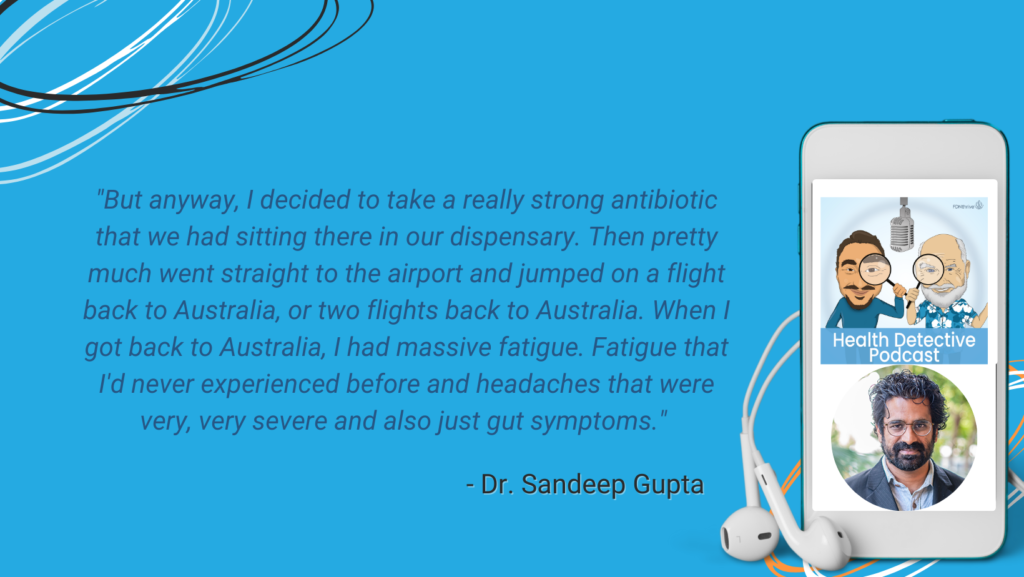
But anyway, I decided to take a really strong antibiotic that we had sitting there in our dispensary. Then pretty much went straight to the airport and jumped on a flight back to Australia, or two flights back to Australia. When I got back to Australia, I had massive fatigue. Fatigue that I’d never experienced before and headaches that were very, very severe and also just gut symptoms.
I was basically a mess. I remember telling my best friend at the time that I’d had a health breakdown and went to see a specialist neurologist at the hospital where I was working. He looked at me only for about two minutes and he basically said, oh yeah, you’ve got cluster headaches.
He used a script for something called prednisone at a very high dose. Of course, that has its uses. In many situations it can be lifesaving, but in that situation, my intuition was just like, hang on. There’s gotta be more to this. What about the whole story of the antibiotics that didn’t even get discussed at all?
Dr. Sandeep Gupta Heals Himself Quickly
I actually just went on a journey of reading more about the effect of antibiotics on the microbiome and bringing balance into the microbiome. That was just through internet research. And through that, I was able to basically heal myself pretty quickly. I then went to a one-day program of what was called the Australasian College of Nutritional and Environmental Medicine, which gave me a couple of other pieces, like the importance of getting off gluten, dairy, and sugar.

So, I made those dietary changes and actually came good quite quickly, which that was really my disillusionment moment with the conventional medical system. Cause you know, it was like, well, hang on. If it was that simple, why didn’t you guys just go in that direction.
[00:06:28] Detective Ev: And that’s a question many of us have. What’s interesting about you is of course, you did this research and were able to figure it out maybe quicker than the average person who doesn’t have your background.
I know I read the bio, but it’s still worth going into. Before this retreat that you were at with this experience, what was your life and career like before this? You weren’t in the natural space at all from my understanding, correct?
[00:06:50] Dr. Sandeep Gupta: No, I wasn’t. I was working in intensive care medicine, mainly dealing with post-cardiac surgery patients. I was working like 3 or 4 /24-hour shifts.
[00:06:59] Detective Ev: 24-hour shifts!
[00:07:01] Dr. Sandeep Gupta: 24-hour shifts. But you got to go and lie down, have a bit of a sleep, like for six or eight hours. So, it wasn’t too bad really, and get paid for that. You might very occasionally have one night where you’re just up all night, someone really unwell.
Dr. Sandeep Gupta Goes into Cardiology & Intensive Care Medicine
[00:07:14] Detective Ev: What got you into that work? Were you just like a high achiever or did you have a passion for medicine? What got you into that?
[00:07:21] Dr. Sandeep Gupta: So, when I graduated from med school, actually during med school, I studied Ayurveda just on the side. I’d always had an interest in meditation and yoga. Ayurveda kind of complimented that really well. I remember seeing when I was in fourth year medical school, I saw a sign for Holistic Medical Center. I thought, whoa, that’s a pretty cool idea. I mean, why wouldn’t we do that? Why wouldn’t you set your career up like that? I thought that was the intention that I had just before graduating.
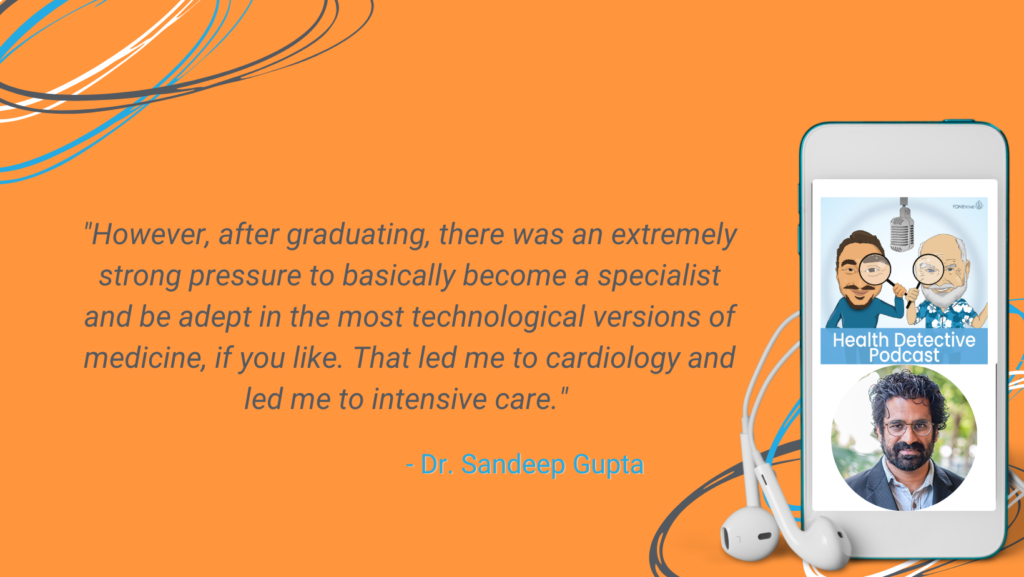
However, after graduating, there was an extremely strong pressure to basically become a specialist and be adept in the most technological versions of medicine, if you like. That led me to cardiology and led me to intensive care. Even looking back at that now, I do think that that intensive care medicine is where modern medicine shines.. Basically, be when someone has a very acute, severe syndrome. They’re basically fighting for their life. Then the ability to be able to put them on a ventilator, give them ionotropic or circulatory support, dialysis. All those kinds of treatments are excellent.
There’s no doubt about it. Yeah, that was my path up until then.
Dr. Sandeep Gupta Looks Objectively at Both Sides
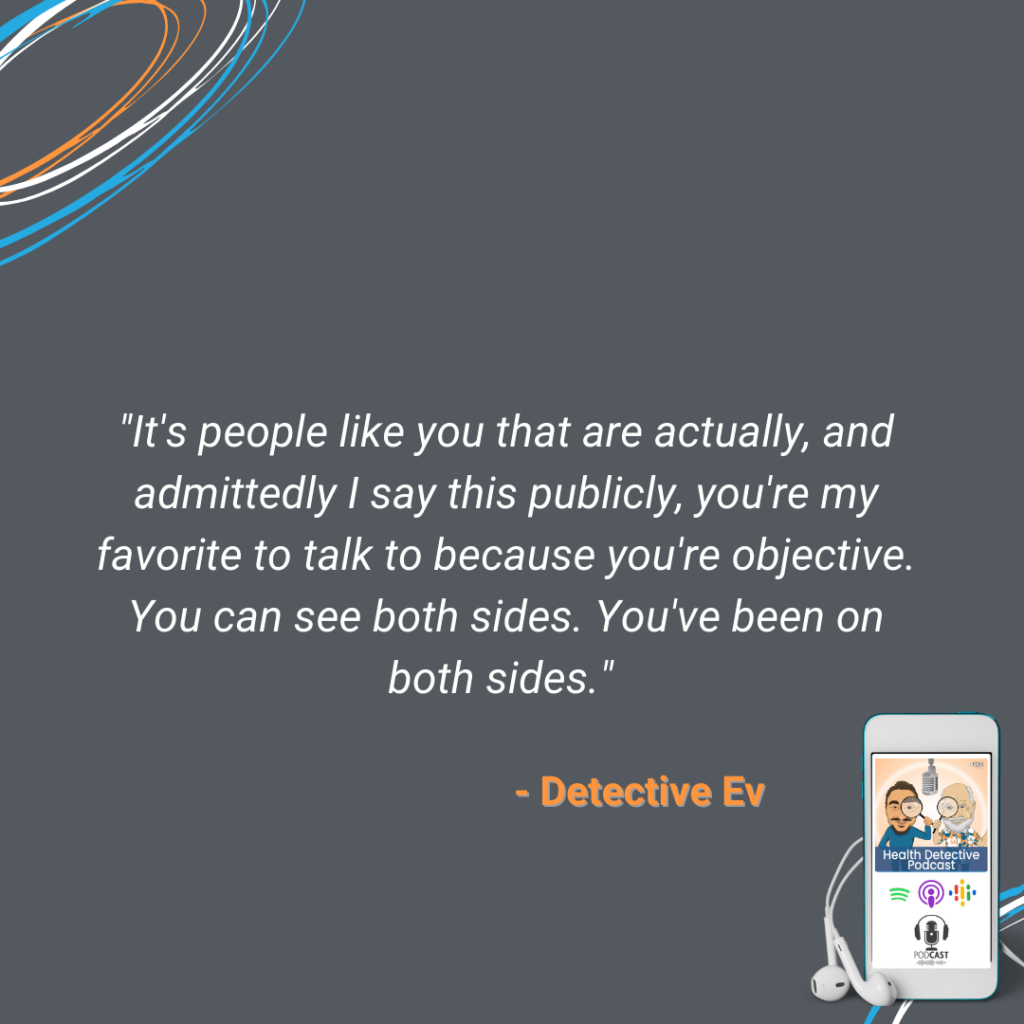
[00:08:32] Detective Ev: It’s people like you that are actually, and admittedly I say this publicly, you’re my favorite to talk to because you’re objective. You can see both sides. You’ve been on both sides.
I was just interviewing a woman named Kiran Dunstan, Dr. Kiran Dunstan. She is someone who was just on our Health Space Unmasked program for FDN. She’s an OB-GYN. You at least had this openness to it when you saw that holistic medicine thing, right? Maybe it wasn’t the path you took but you were studying Ayurveda, you studied meditation.
She had never dove into this at all. It was her own health issues that eventually led her to thinking outside the box. Again, the reason that you’re my favorite people to talk to is because we need to be objective on both sides. I think a lot of FDNs are really good with this, but there are plenty of people in the natural and functional space, generally speaking, who become very dogmatic. They start condemning Western medicine for every little thing. I think that’s not helpful. I think that’s crazy, actually.
There are car accidents every single day. People do stupid stuff. They get hurt. A lot of the times, yes, it might be our Western society and modern lifestyles that are causing us so much damage. And sure, if we never did those things, maybe we wouldn’t need as much of the severe treatment or the specialized treatment and stuff.
Dr. Sandeep Gupta Consumes Alternative Medicine Information
But nonetheless guys, most of us got into functional medicine after a run-in with Western medicine. Like we needed that at some point. So, let’s always be open-minded and smart. My whole thing is this, the last thing I’ll say is that if the goal truly is getting the best results for the patients or clients, both sides need to learn to work together. We need to stop arguing each other and we need to learn to work together.
So, you had this experience with yourself where now your mind is getting probably opened even more. Clearly, it was at least somewhat open before to this if you were studying the things you were. But now you’re really having an experience.
How did that then transform your career and the path that you were taking? Because of course we’re talking 17-year difference now almost. But even reading your bio today and then hearing the story, there is a dramatic difference from then to now. So, what happened after that?
[00:10:30] Dr. Sandeep Gupta: When I went through that process of getting better through fixing my microbiome and diet and so on, you could say that was just like one big step in a different direction down the rabbit hole, if you like.
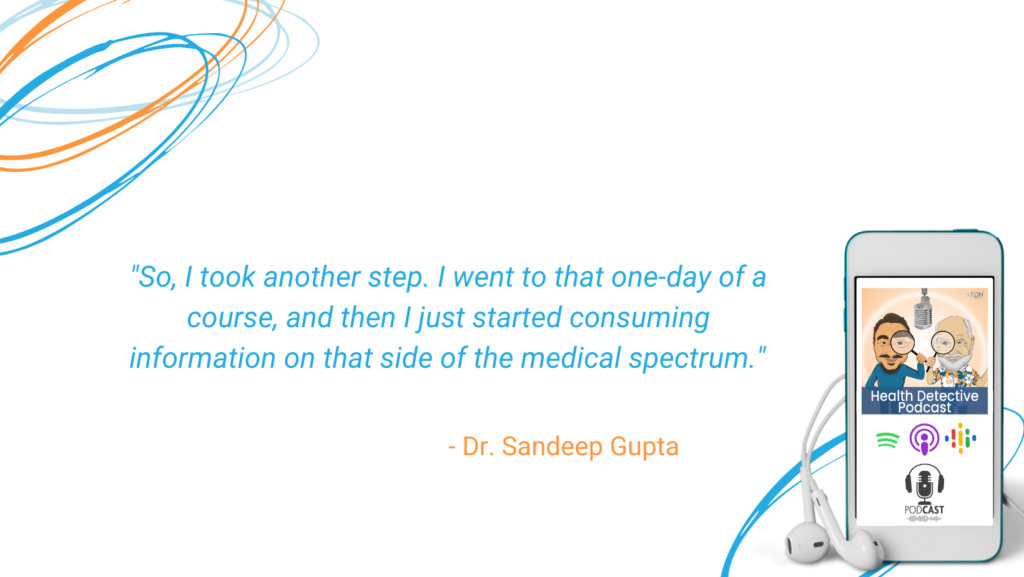
So, I took another step. I went to that one-day of a course, and then I just started consuming information on that side of the medical spectrum. I don’t think they were using the term functional medicine in those days, but nutritional medicine, alternative medicine, complimentary medicine. Really, just like I had an appetite to know more and more and more. So that was the first thing was just me, myself learning more and more.
Dr. Sandeep Gupta Transitions to Integrative General Practice
Now there came a point where I started feeling like it wasn’t sincere to not be offering that in my work life. That was a few years down the track, I think. I started using a little bit of nutrition in the intensive care unit, but that didn’t go down extremely well.
I just started then making a plan to transition my career over from intensive care medicine to integrative general practice. It was, you know, it was maybe a five-year process. But I think it was a very, very good decision and that’s led to a lot of beneficial outcomes in my life and hopefully those of my patients.
[00:11:47] Detective Ev: So, it was your own new understanding where you felt that if you were not doing this in some way, basically (now it doesn’t have to be the whole thing), but if you weren’t doing this in some way, it just wasn’t being authentic because now you know about this.
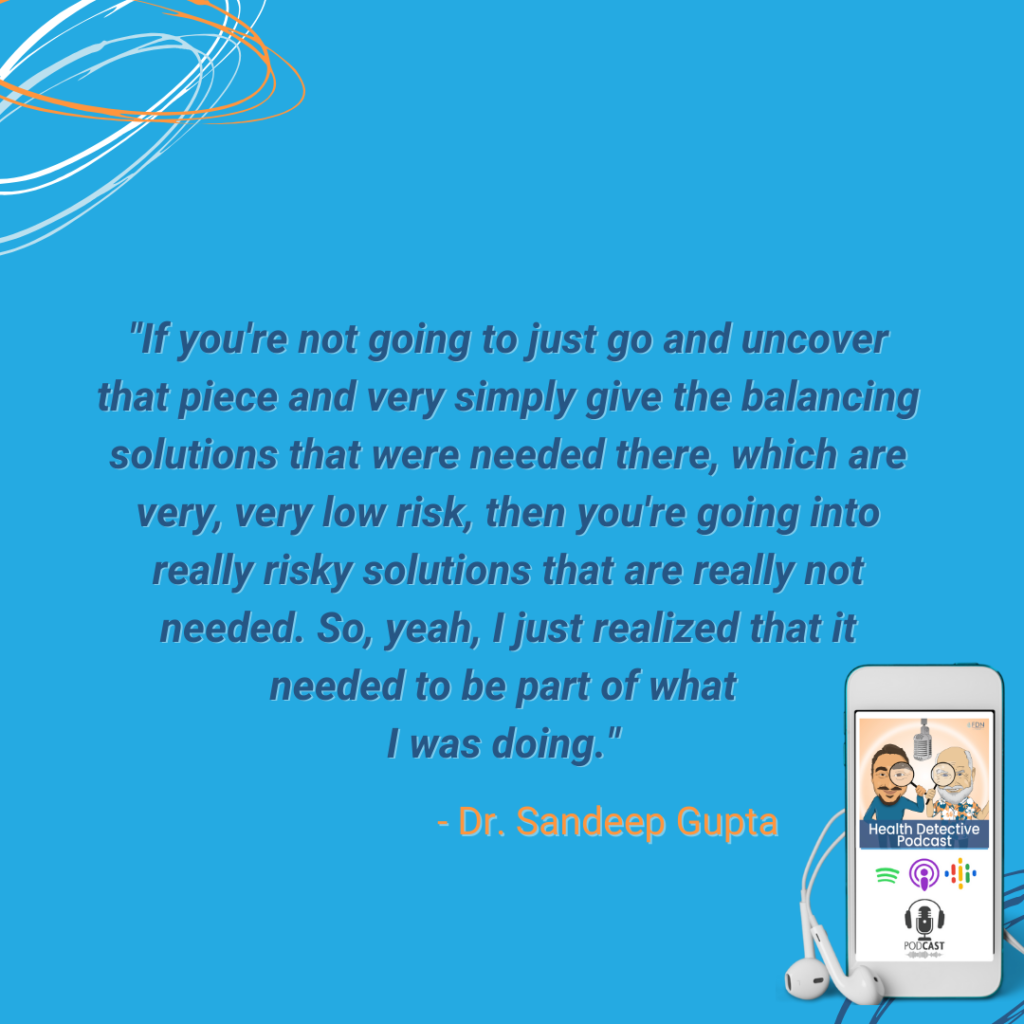
[00:11:59] Dr. Sandeep Gupta: Exactly. It’s like, for instance, if someone had a similar problem to me, they were getting massive headaches and fatigue due to having antibiotics. Well, hang on, you know. If you’re not going to just go and uncover that piece and very simply give the balancing solutions that were needed there, which are very, very low risk, then you’re going into really risky solutions that are really not needed. So, yeah, I just realized that it needed to be part of what I was doing. Otherwise, there was so many people probably who are in the same situation as me.
Dr. Sandeep Gupta Is Open to Alternative Medicine Before Health Journey
[00:12:35] Detective Ev: I was in the same boat, man. I mean, of all the health issues that I dealt with, one of the things that (who knows how bad this got me), I was on, 20 courses of antibiotics, some lasting a month or more before the age of 18. Then we wonder why I have severe cystic acne and all these other issues, mental health issues. Right?
I think I grew up in kind of that final generation where we were still handing these things out like candy. You have a cold.? Okay. We’ll give you an antibiotic as well, just in case you get a sinus infection. Now thank God, most conventional doctors would never do something like that, we’re a little more hesitant. Forget the health thing for a second, we’re realizing the societal worldly implications of antibiotic resistant bacteria. There are major problems with handing these things out like they’re candy.
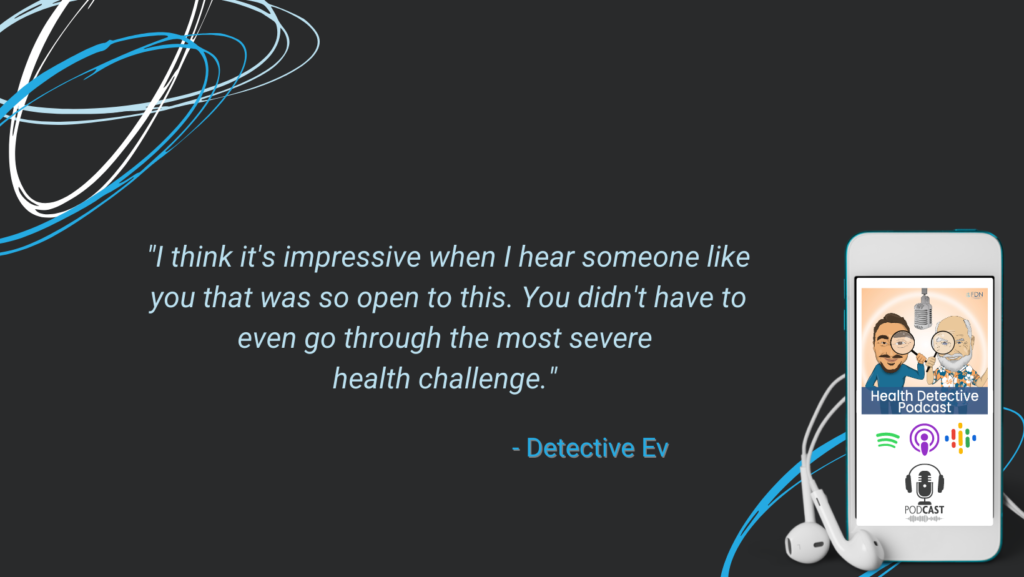
I’m curious because, I don’t want to just toot your own horn, but I think it’s impressive when I hear someone like you that was so open to this. You didn’t have to even go through the most severe health challenge. It’s not like you were diagnosed with cancer and did this. You did this off something that in our world, many people have dealt with, and they don’t look the other way.
I got to ask. In your own words, and in your opinion, why do you think so many doctors are resistant to talking about this kind of stuff or even being open to it? You had an openness to this even before you got sick. So where does this happen? I mean, these are some of the smartest, best people in the world. Why does that happen?
Dr. Sandeep Gupta Faces Conventional Medicine Paradigms
[00:13:55] Dr. Sandeep Gupta: Well, there’s a certain paradigm that conventional medicine has at the moment. That is that illness is caused by certain diseases, and you need to diagnose those diseases and take the proven treatments, which are generally medication based. Now, anything out of that, and you’ll quite commonly hear like a general practitioner say something like, well, there’s no evidence for that. Really what they’re saying is I haven’t actually looked into that. But that’s kind of the general paradigm is that anything that’s outside the standard.
So, let’s say you’ve got heart failure and there’s three standard medications for that. I won’t bore you with what they are. Anything outside that is just considered to be not up to the standard, basically. And why would you muck around with fixing your gut when that’s not the proven treatment for congestive heart failure? You get me? That’s the paradigm.
Then there’s a very strong social and PR pressure to maintain that. So, let’s say you then move out into a cardiology practice or a general practice where you’re working for a practice owner. There’s kind of like some unwritten rules you could say, that get reinforced through the way the doctors talk to each other.

One of them is you don’t go outside the conventional paradigm, generally speaking. That’s just not okay. And if people do that, they’re seen as being a little bit foolish or unwise, or you may have to put up with the snarls of your colleagues, snide comments or whatever it might be.
Dr. Sandeep Gupta Does Research and Alternative Studies
It’s easier to just stay in line and maintain this idea that if someone comes in with massive headaches and fatigue, it’s like, okay, can we diagnose you with an existing, properly studied medical condition? If so, okay. You’ve got cluster headaches. Here we go. Here’s the accepted treatment. Off you go, kind of thing, right? You know, that’s it. You fit into the category.
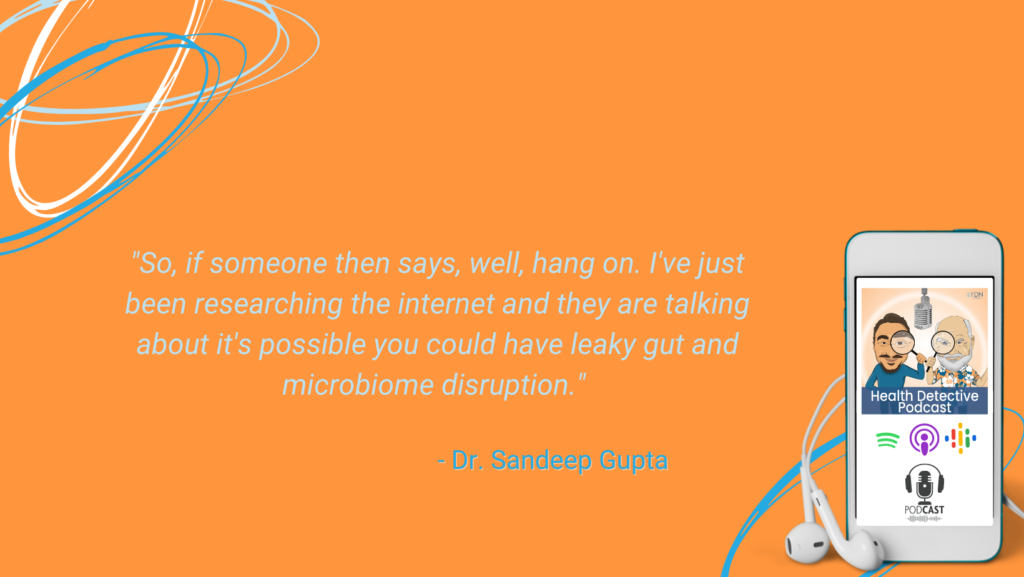
So, if someone then says, well, hang on. I’ve just been researching the internet and they are talking about it’s possible you could have leaky gut and microbiome disruption. Well, again, quite simply that’s just that’s outside of the model. That’s outside the paradigm.
You would simply say something like, well, you know, I don’t think there’s so much evidence for that. I think that’s just hearsay or whatever it might be. We’ve got a proven treatment right here. So, why don’t you just go ahead with that. Why think about these kind of fairy like ideas?
[00:16:27] Detective Ev: I think this is actually a problem that bleeds deeper into society than just even the medicine field. Here’s what I mean. You said it brilliantly in the beginning of what you just talked about. You said how these doctors, like there’s no evidence for that. You realize just like I realize, well, there’s actually a ton of evidence for it, but you just weren’t taught that.
Now, they’re in one of the busiest careers, one of the most stressful careers ever. When are they going to sit down and study for another 20 hours a week when they have a thriving practice and all this stuff going on? I find that this happens in the real world, too. ” Real-world” as if medicine isn’t the real world, the rest of the world.
Dr. Sandeep Gupta Battles the Dogma
It’s almost as if this wasn’t taught on the news or in school, it must automatically be fake. If it was so real, I must have been taught that. I don’t know how we’ve gotten that idea, but that’s a pretty dangerous idea. That, oh, if it’s so important, it must have been taught to me already. I don’t think that’s true at all.
There’s a lot of information out there. And I think that’s one of the most frustrating things for people like us. I’m not actually sure who it’s tougher for. Because you’re a doctor going away from that normal paradigm, I’m a lay person that has to, in a sense, sometimes debate these medical professionals or people that are being told things by their medical professionals without any medical degree.
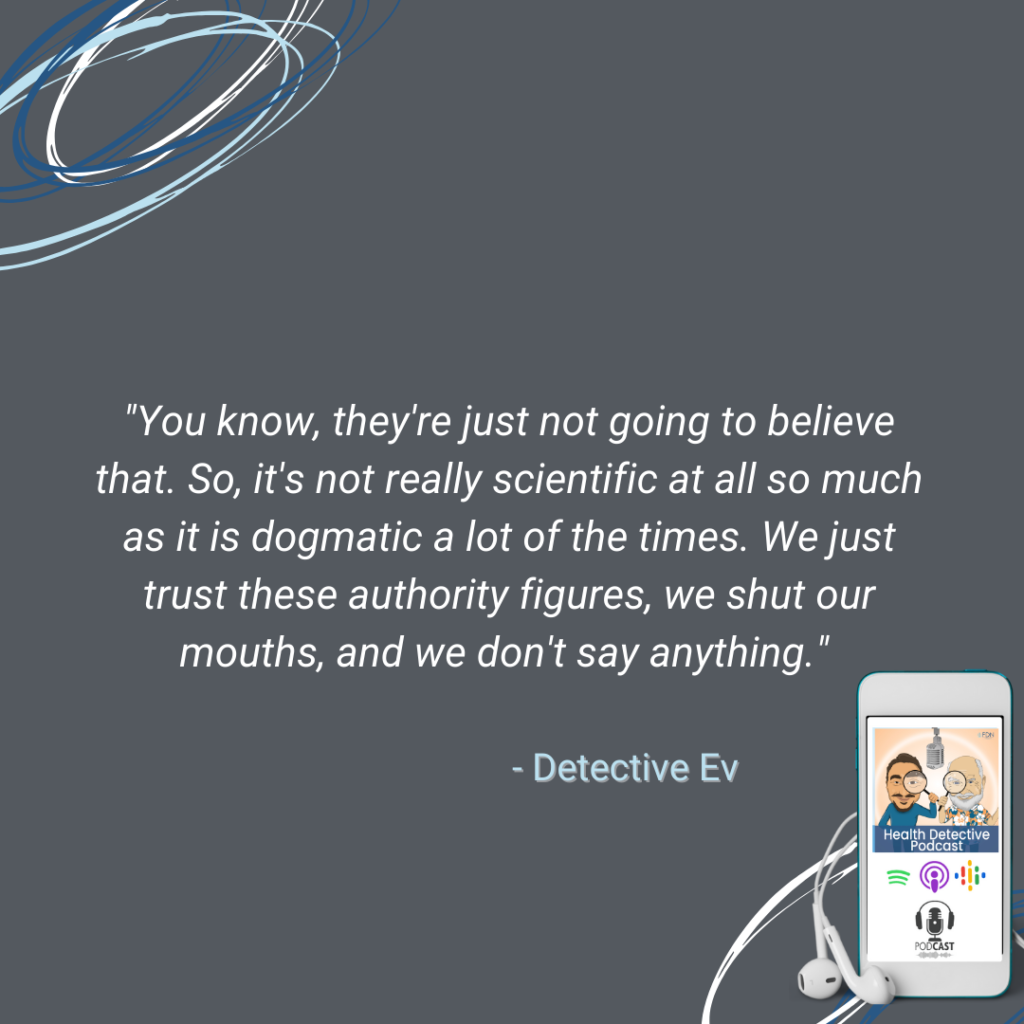
I’m not sure who it’s tougher for. But it is so painful almost when you want to show someone, hey, here are the studies. Here is the actual peer reviewed literature showing that what I’m saying to you is accurate. You know, they’re just not going to believe that. So, it’s not really scientific at all so much as it is dogmatic a lot of the times. We just trust these authority figures, we shut our mouths, and we don’t say anything. Again, I think that’s a huge problem even outside of medicine.
Dr. Sandeep Gupta Explains Reductionism vs. Wholeism
[00:18:02] Dr. Sandeep Gupta: Yeah.
Look, it’s what you call reductionism. That’s become the dominant paradigm in our society. One way of explaining that would be, you know, the universe is made up of thousands of different nails and all you need to do is find the individual hammer for each one.
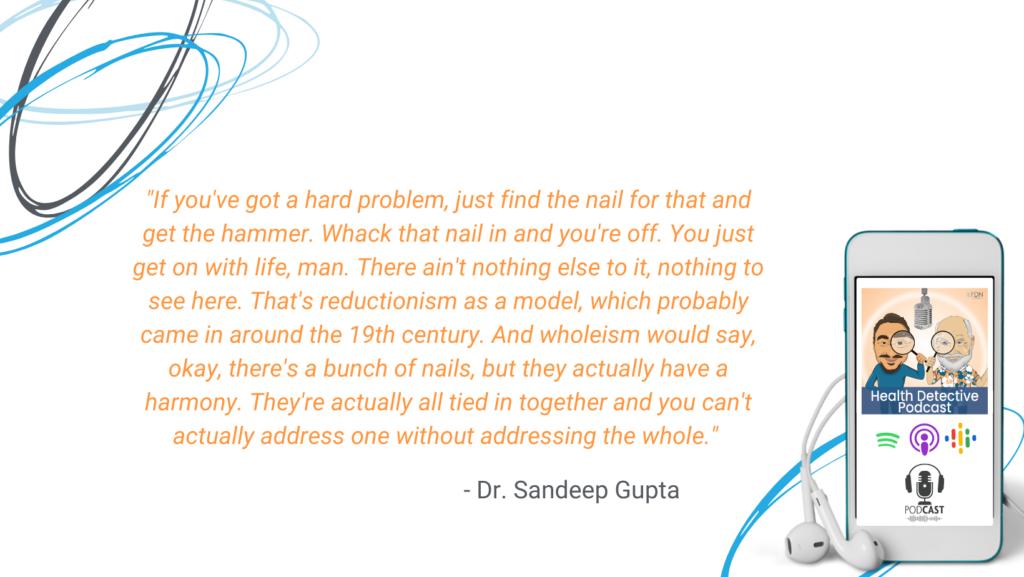
You need not consider how they’re connected in any way. If you’ve got a hard problem, just find the nail for that and get the hammer. Whack that nail in and you’re off. You just get on with life, man. There ain’t nothing else to it, nothing to see here. That’s reductionism as a model, which probably came in around the 19th century.
And wholeism would say, okay, there’s a bunch of nails, but they actually have a harmony. They’re actually all tied in together and you can’t actually address one without addressing the whole. That paradigm was kind of dropped in many ways.
[00:19:00] Detective Ev: I think you could see it exactly in functional medicine a lot of the times. My gosh, I’m guilty of this myself. When I got into this space because of the health issues I dealt with, what was I looking for? The one diet that would help me, the one supplement, the one alternative therapy. And it wasn’t one nail like you said. It turns out that you had to look at it several different factors.
Maybe that’s why FDN is as successful as it is. Because wording it in the way that you just worded it, we’re not really taking that reductionistic approach. It could be a multitude of diets or different diets at different times, depending on what you’re going through, and we’ll figure that out for the person. It’s definitely pretty interesting.
Dr. Sandeep Gupta on the American Medical System
Now, the last question I want to ask, just to try to get your perspective on things. Did you grow up in Australia all your life? Have you been there your whole life?
Dr. Sandeep Gupta: Yup. I have, yeah.
Detective Ev: Okay. Have you visited the US? Well, you at least understand the medical paradigm over here.
[00:19:46] Dr. Sandeep Gupta: Oh yeah. I worked a little bit with the specialists and so on there in Oregon when this outbreak happened. And I had quite a bit to do with the local hospital. I thought the whole system was pretty bizarre to be honest.
[00:19:58] Detective Ev: All right. That’s what I was kind of curious about. Are you finding the same problems that we have in America? Because I know a lot of the times people want to blame just like the American pharmaceuticals and the stuff that goes on here. But I think this is like a Western society problem, a modern society problem, and I could be wrong.
Do you think Australia has the same kind of issues where just, hey, there’s a certain paradigm, people have to follow it? Do you think America’s worse? What’s your opinion?
[00:20:24] Dr. Sandeep Gupta: Yeah.

I mean, the American system’s worse in a sense, because it’s basically, there’s no limit to the kind of charges that you can incur if you have an acute medical condition.
I hear that medical problems are the commonest cause of bankruptcy there, which is huge, you know. My understanding is, let’s say you get hit by a car or something, and you’re insured. You could be up for hundreds of thousands of dollars for, you know, a few days in intensive care or whatever it might be.
Dr. Sandeep Gupta Compares American System vs. Australia & the UK
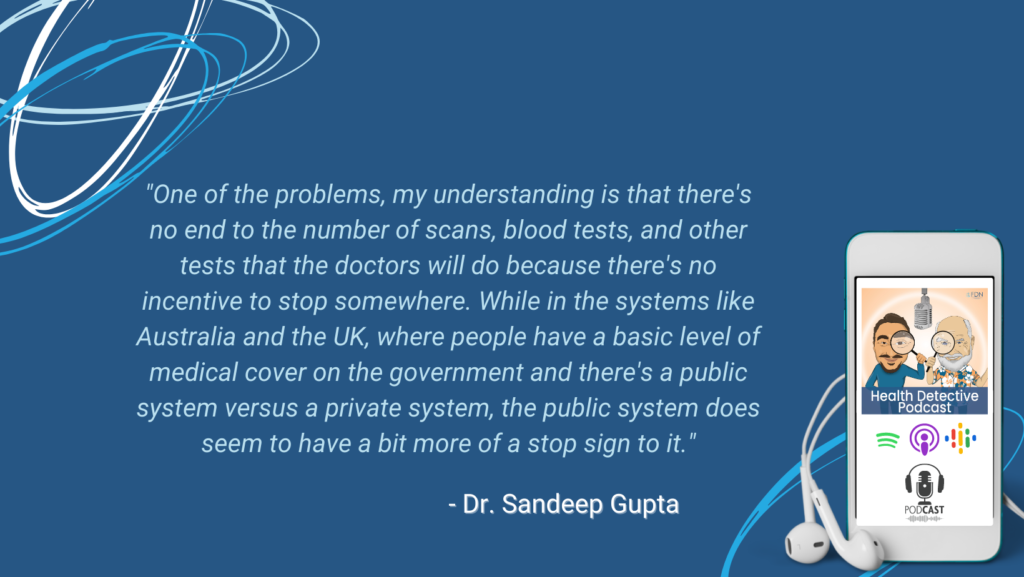
One of the problems, my understanding is that there’s no end to the number of scans, blood tests, and other tests that the doctors will do because there’s no incentive to stop somewhere. While in the systems like Australia and the UK, where people have a basic level of medical cover on the government and there’s a public system versus a private system, the public system does seem to have a bit more of a stop sign to it where people are like, hang on.
No, we don’t need to do another MRI here. There’s basically been one. We’ve got our diagnosis. Let’s just stop. No, we don’t need to do anything more. We’ve just got a standard of care. So yeah, you could say that there does need to be some control and stop sign over that, over just the acute medical care. Otherwise, the cost can just get huge and out of control.
Then I think there’s just so many types of insurance schemes and so on out there that it’s extremely confusing. My understanding is sometimes you don’t know whether an insurance company’s going to pay or not. You’ve got no idea really. So, it’s a bit more of a confusing system.
Dr. Sandeep Gupta Explains American Health System’s Problems & Positives
While over here, let’s say you get admitted into a private hospital. The first thing is a quick check on, okay. Is your health fund going to pay or not? That’s the end of the story right there. If you get a yes, then that’s it. They’re going to pay for everything other than a small excess.
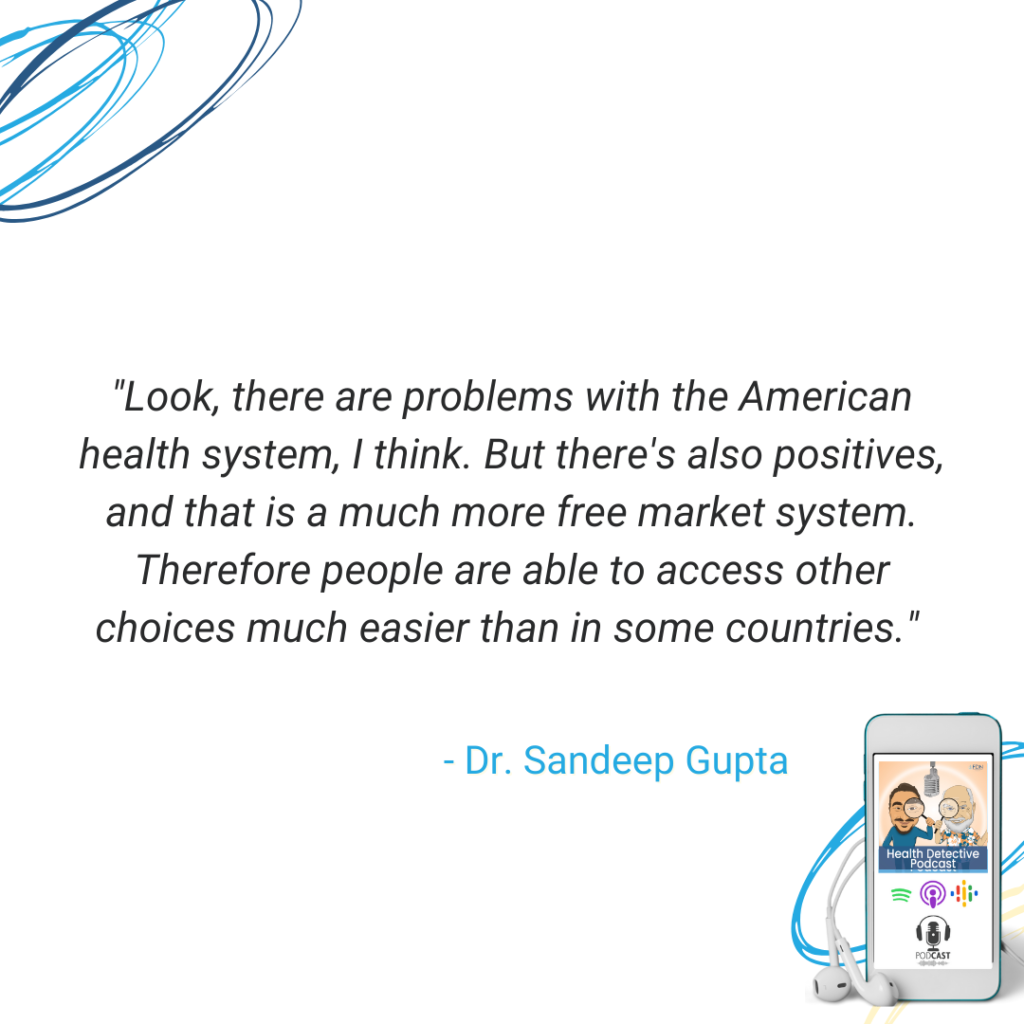
Look, there are problems with the American health system, I think. But there’s also positives, and that is a much more free market system. Therefore people are able to access other choices much easier than in some countries.
One family member told me out in Canada, you’ve only got certain medications you’re allowed to use as a registered doctor and anything outside that is not covered. So that restricts things a fair bit. I guess at the end of the day, it just means that you just got to move towards a cash type practice. If you want to go outside the norms.
Look at the Positive of An Expensive American System
[00:22:43] Detective Ev: That’s what happens a lot. I mean, the chiropractors out here, for example, there thankfully are some manipulations and therapies that they use, which are covered by insurance now. You can come in and pay a small copay and that’s it. But chiropractors that are doing things from a more functional perspective or want to really go outside the box or offer alternative therapies, which is most of them. Chiropractors out here, like you’re paying them cash.
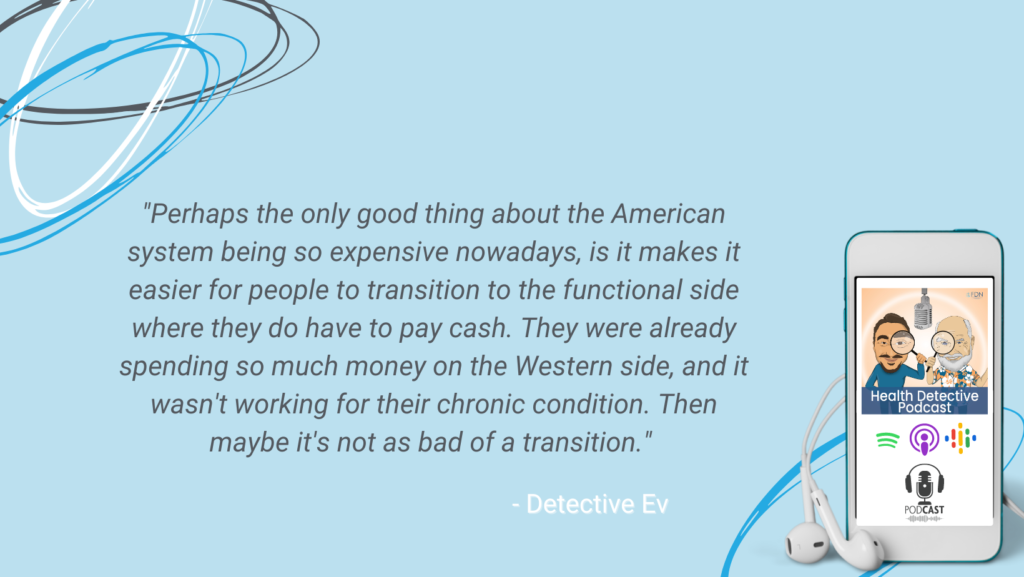
This is going to happen to a lot of the naturopathic doctors or the functional medicine doctors as well, these are cash things. Perhaps the only good thing about the American system being so expensive nowadays, is it makes it easier for people to transition to the functional side where they do have to pay cash. They were already spending so much money on the Western side, and it wasn’t working for their chronic condition. Then maybe it’s not as bad of a transition.
Ideally, it’d be wonderful to live in a world where people don’t have to spend such an insane amount on these types of tests and all this stuff, but we’re just not there yet. It’s something around like 48% of Americans don’t even have a $500 savings basically for an emergency or whatever.
Well, if they don’t even have a $500 savings, what are they supposed to do with the medical bills? What are they supposed to do to get the functional lab testing that might be necessary to restore their health? It’s tough, man. I think what we’re doing is exactly what we need to be doing. Yes, it’s higher ticket rate now, but we’re out here spreading the word.
FDN’s DRESS Protocol is 4/5ths Free

There are plenty of things that people can do without ever having to use a functional lab test. Right? At FDN, guys, we teach D.R.E.S.S. It’s diet, rest, exercise, stress reduction, and supplementation. And you’ll notice supplementation’s last. Those other four things are free. You don’t ever have to pay anything to do those other four. We always teach those at FDN as well. But we will get into that another time.
I’m curious about going back to your story and your journey with this and how this has led to a changing practice. And I thank you for your perspectives on the world and what’s going on. I think that’s interesting and a little bit of a change up from what we normally talk about.
When you were doing this research and discovering new things that worked for you, were you shocked by this or did it make sense, given your history of like diving into Ayurveda? Was it just more of a confirmation of things that you had learned in the past? Because I know for many of us it’s literally shocking when we realize it works.
Dr. Sandeep Gupta Experiences Shocking Health Results
[00:24:50] Dr. Sandeep Gupta: I think there was a shock factor there just to realize how profoundly, for instance, my gut was involved in my symptoms. I think it would be fair to say, I probably wouldn’t be surprised if there was a little bit of a connection there. Like maybe the gut was amplifying things or something like that. But it turned out that my gut was virtually a hundred percent the cause. Yes, that was very shocking.
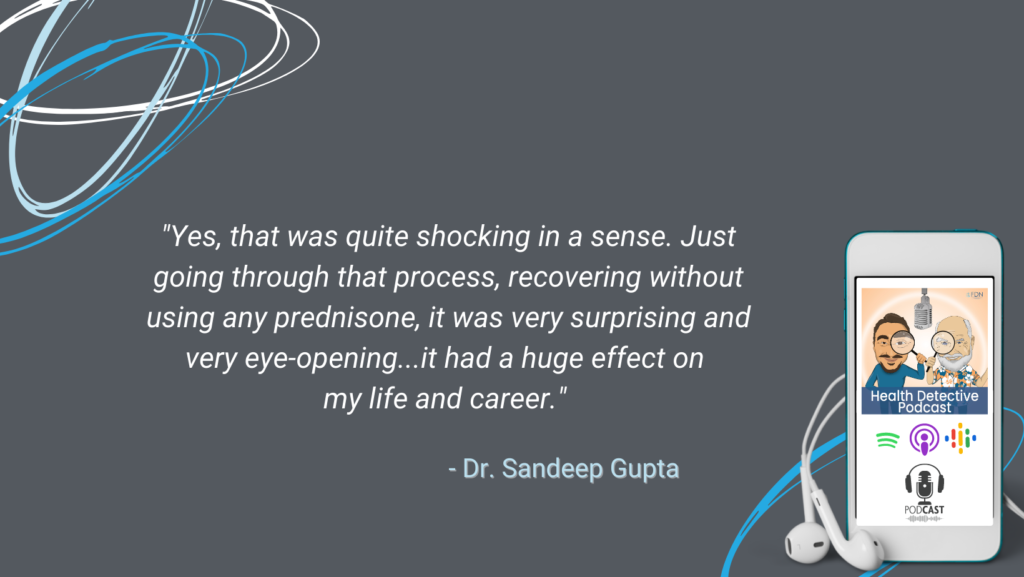
I had the experience at one point where I could just switch off my headaches by taking glutamine as a supplement. So that’s what it was, it was the leaky gut. Yes, that was quite shocking in a sense. Just going through that process, recovering without using any prednisone, it was very surprising and very eye-opening.
As you could see, the reason I then started, you know, I was going pretty much straight down the conventional paradigm, and I started taking a 90 degree turn at that point. So, yeah, it had a huge effect on my life and career.
Commercial Break – Try the FDN Course for Free

[00:25:46] Detective Ev: Hey guys, it is Detective Ev here popping in really quick. Maybe you are listening to this episode and thinking I would like to have those same changes in my career and health as well. Well, that is what the FDN course is designed to do. We actually include five different tests in the cost of tuition so that you can run these on yourself while you are learning how to go and do this as a real career, a real business or job, if you end up working for someone else.
If you’ve been thinking about the course before, which if you clicked on this episode, I’m assuming you are, then you want to go to fdntraining.com/call that’s fdntraining.com/call. There, you can actually talk to one of our course advisors. You can get your questions answered and figure out if this is for you.
What’s really cool about that team is if they don’t think that this is for you, they’ll recommend you in the direction that would best suit you. There are some people that are not really suited for FDN at this time, or maybe ever, depending on what they’re trying to learn.
So that’s, fdntraining.com/call to book now.
Dr. Sandeep Gupta Starts His Practice
All right. Back to the episode.
Wonderful. You have an in-person practice now that people can come to in Australia, correct? Well, first of all, shout that out. We’ll shout it out again at the end, but I want to hear it now, so people know.
[00:26:53] Dr. Sandeep Gupta: It’s called Lotus Holistic Medicine.
It’s on the Sunshine Coast in Australia. We see people with all kinds of chronic illness.
[00:27:00] Detective Ev: That’s what I was going to ask next. I mean, what are the typical cases, if there is any typical ones, that you’re seeing, when people finally get to you. I’m going to guess you’re not the first person they go to, unfortunately,
[00:27:11] Dr. Sandeep Gupta: Correct.
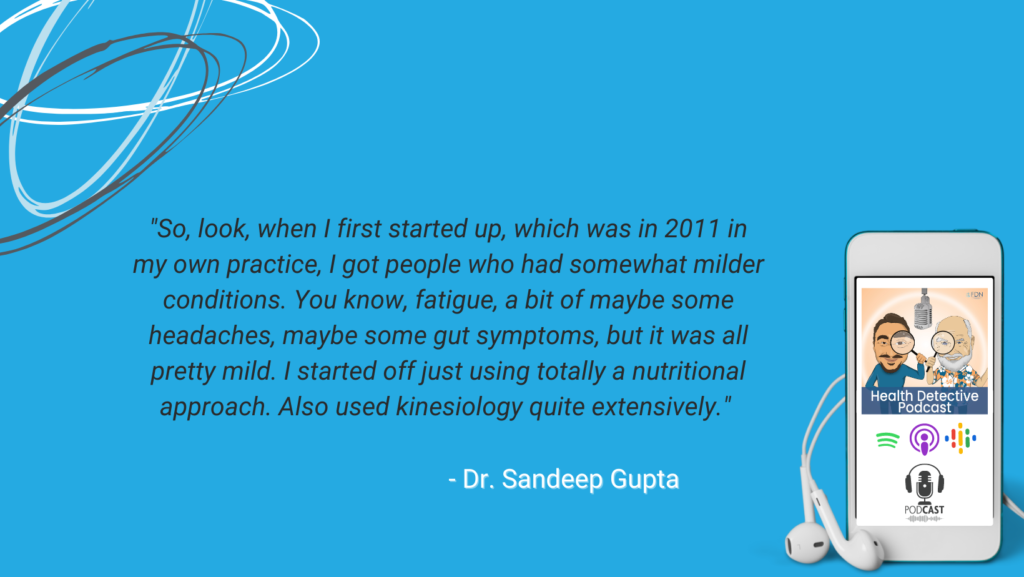
So, look, when I first started up, which was in 2011 in my own practice, I got people who had somewhat milder conditions. You know, fatigue, a bit of maybe some headaches, maybe some gut symptoms, but it was all pretty mild. I started off just using totally a nutritional approach. Also used kinesiology quite extensively.
What I actually experienced was that there was a group of clients that just got better. The first group of clients, they just got better, and they left. Then I got a new subset of clients who seemed to not respond to just a basic nutritional approach.
Now, around that same time I had a house flood in the Sunshine Coast here. My partner at the time became very unwell. So that led me looking into biotoxin related illnesses and mold related illnesses specifically, contacting Ritchie Shoemaker, and joining up to his physician training.
Dr. Sandeep Gupta Gets More Complex Cases
Interestingly, at that same time, I was starting to get more and more difficult clients. I started looking at tick-borne diseases, running tests like IGeneX, and starting going to seminars on that. Basically, what I learned in order to assist my partner at the time was the same information I needed to help my clients at the time.
It was starting to learn about biotoxin related illnesses, mold, Lyme, and muscle activation, things of that nature. All of a sudden, when I got certified, there was a massive influx of people who wanted to look into mold related illnesses. I couldn’t believe how many people sought me out at that point.

Since then, I’ve started getting more and more complex cases. Now, I tend to be one that people come to after they’ve seen 10 or 20 other doctors and say things like, just want you to know doc, you’re the last one here on the list.
[00:29:04] Detective Ev: And it’s unfortunate, right?
Because typically we’re the ones that can help them the most. Not that I’m a doctor, but FDNs, we get the same thing. Are you kidding me? It’s the fact that I’m not a doctor I’m really the last person on their list. It’s like, all right, we’ll give this kid a chance. Then all of a sudden, this is actually the thing that worked most effectively for them.
It’s a shame that they have to go so far through the system before this happens. Especially these more complex cases nowadays. What does Western medicine even do for this? I’m assuming they’re not identifying the mold stuff. They miss Lyme half the time. What are they even doing for these people? Are these people coming on medications that they shouldn’t even be on, I guess?
Dr. Sandeep Gupta Works Towards a More Functional System
[00:29:39] Dr. Sandeep Gupta: Yeah.
Look, I think it does still have a role. I think there needs to be a process of excluding any autoimmune or connective tissue disorder and making sure that there has been a thorough process of exclusion. But then once that’s been done and they’ve found someone with a multi-system illness, they basically then need to (and we were actually looking at this with the government in Australia), there needs to be a diagnostic process of, is this a mold related illness? Is it a tick-borne related illness or is it just what we call a standard chronic fatigue syndrome, which has got a huge overlap of course, with what I just described before?
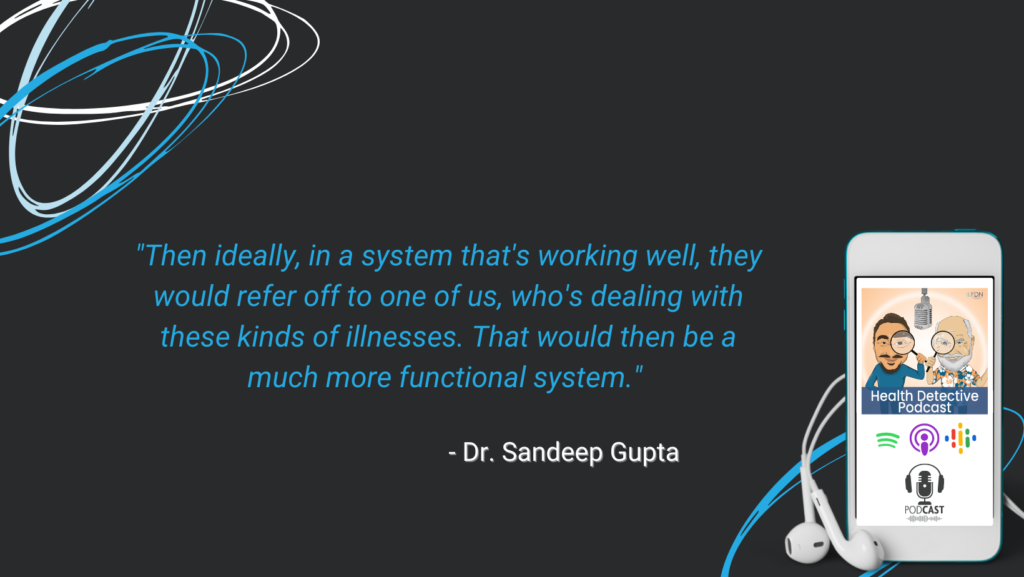
But they’ve got to get some basic things. Then ideally, in a system that’s working well, they would refer off to one of us, who’s dealing with these kinds of illnesses. That would then be a much more functional system.
[00:30:27] Detective Ev: How do you think that’s going to go? Do you think you guys are going to be successful in convincing the government that this is necessary?
[00:30:33] Dr. Sandeep Gupta: We’ve still got a few challenges there. Even if we can get partial buy-in on that, that’s still a start. We’re actually now running a research study, which they’ve granted, the NHMRC, the National Health and Medical Research Council of Australia, have granted $1 million to do a research study into mold related illness here. We’re hoping that the results of that will help to then basically move the system towards understanding mold related illnesses and being willing for general practitioners to refer to doctors who are expert in this area.
The State of Florida’s Many Mold-Damaged Homes
[00:31:06] Detective Ev: Let’s assume they have chronic symptoms. How many of those people do you think are walking around with mold related stuff and just have no idea that’s even impacting them?
[00:31:15] Dr. Sandeep Gupta: It’s definitely a lot. Scott McMann who’s there in Roseville, New Mexico wrote a study. He said somewhere around 11% to 13% of the general population. Which America is what, 330 million people? So, you’re looking at somewhere around maybe 35 to 40 million. That’s a lot of people.

[00:31:38] Detective Ev: I’m thinking about something like the state of Florida where it’s estimated that like 80 plus percent of the homes have some kind of mold damage because it’s very low elevation. Florida hosts like 22 million people.
The highest point in all of Florida is only like 380 feet above sea level. It’s the lowest, high point of any state. And it’s a huge state, that’s what’s funny. It’s large, but it’s low. Then you have the Everglades National Park, you got hurricanes all the time.
My friends live in an apartment complex that is built with solid concrete. The WIFI signals don’t even go through from the neighbors because it’s that solid. They have to do that because the hurricanes will come and just decimate the place. That’s great they’re worried about the hurricanes, but people don’t really think about the aftereffects of that.
It wasn’t just the hurricane itself. It’s the water damage it’s going to lead to over time. You get these homes that look absolutely beautiful from the outside and the inside. You tear up those walls, and this person had black mold in their house or some other kind of mold. It can be pretty serious stuff.
Dr. Sandeep Gupta Puts Emphasis on Patients’ History
I don’t think enough people know about it. I tend to believe that it’s not for everyone, but it’s one of the side-effects of today’s world. Because we walked around with mold all the time. There’s mold everywhere when I go outside, I’m inhaling those spores. But it shouldn’t always have this terrible effect on us. We’re inside, we have all the other aspects of today’s modern lifestyle. It’s just one more thing that’s on top of this.
So, where do you start for these clients? Because I know that before you had said you were focusing more on just nutrition and then assuming you transitioned out of just that at some point, do you run certain labs on every single client or is it different labs for different people? Like how does that work for you?
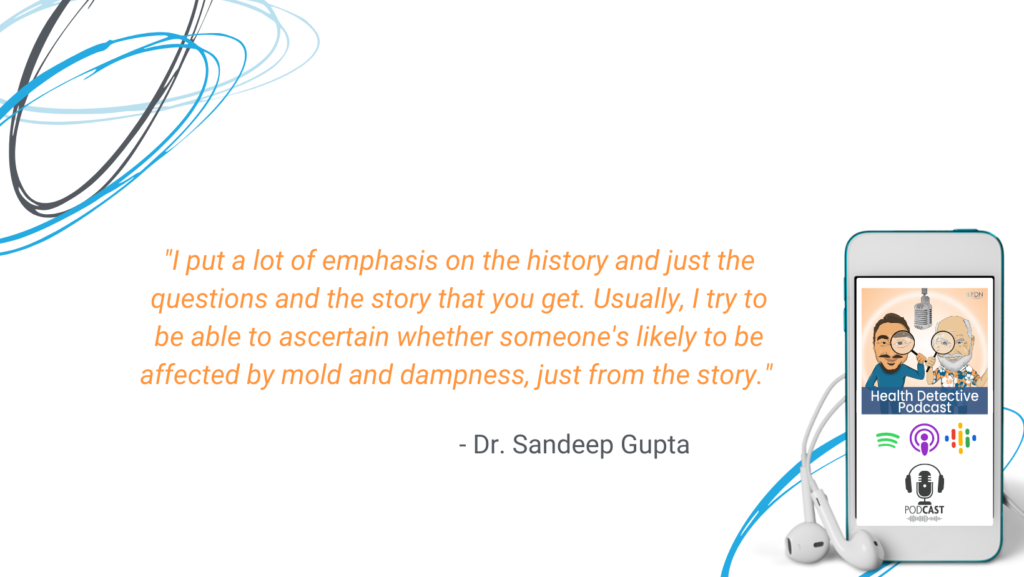
[00:33:14] Dr. Sandeep Gupta: Different labs for different people. I put a lot of emphasis on the history and just the questions and the story that you get. Usually, I try to be able to ascertain whether someone’s likely to be affected by mold and dampness, just from the story. I try not to put all my eggs on the testing, so to speak.
Really, what I try and do very consciously is work out, what question am I trying to answer through any particular test? I do see this a little bit in the functional medicine world. People go and run a urine mycotoxin test, for instance. They’re using it to answer the question, does this patient have a mold problem? I would say, hang on, hang on, hang on. No, no, no, no. That’s not how you use it.
Dr. Sandeep Gupta Uses Labs to Answer Specific Questions
Basically, you can use it to answer the question, how well is the client excreting mycotoxins right now and which particular mycotoxins might be involved? That’s reasonable. But you got to get to the stage where your history taking or your questionnaire and your interview with the client is sophisticated enough to be able to answer that question already. Then you’re just using the test to answer specific questions.
For instance, if I do an organic acid test, it’s more about complications. Is there actually mold infection going on or Candida infection going on? Is there an elevation in oxalates? Is there a mitochondrial dysfunction going on? Is there deficiency of various B vitamins due to the oxalates and the fungus? Is the glutathione pathway thrown out? Those are the questions that I’m using it to answer.

I think it’s really useful to always ask that question, what am I looking for from this test specifically?
[00:34:55] Detective Ev: Very interesting. How did you get involved with FDN? Like, did you meet Reed Davis somewhere? How did that work?
[00:35:03] Dr. Sandeep Gupta: I got involved firstly, in something called Metabolic Typing. I did my Masters of Nutrition way back in 2008 through to 2010, I think it was. One of the things that Dr. Gabriel Cousens, I don’t know if you’ve come across him, but he did talk about Metabolic Typing quite a lot. I went back and looked at the original research that he quoted in his book, which was called Conscious Eating. It was actually Bill Wolcott that was quoted.
Dr. Sandeep Gupta Does Metabolic Typing, Meets Reed Davis, & Becomes an FDN Medical Director
So, I went and looked that up and contacted Bill Wolcott to find out about how his Metabolic Typing system worked. It was actually quite a simple process to sign up as a Certified Metabolic Typing Advisor. I did that and went through that process. Then that allowed me to be part of the Metabolic Typing forums.
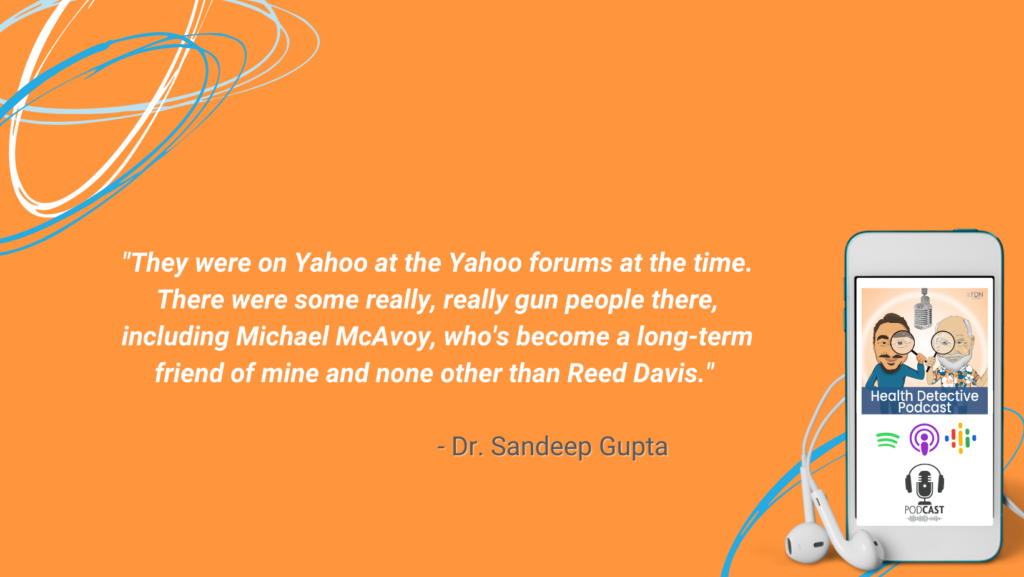
They were great, man. They were on Yahoo at the Yahoo forums at the time. There were some really, really gun people there, including Michael McAvoy, who’s become a long-term friend of mine and none other than Reed Davis. I believe I was actually on there when Reed actually started Functional Diagnostic Nutrition and started talking about it, which was just a face-to-face thing initially.
Slowly, he rolled it out as an online program. I got to know him, and I signed up for the course, did it, and found it very, very useful. Slowly, we built a relationship and a friendship. I think a few years afterwards, can’t tell you how many years, but I think it was probably 2017 or so, he called me up and asked if I’d like to be one of the medical directors and I was honored to do so.
I’m glad I’ve been able to contribute in a small way to the development of FDN and the introduction of things like CIRS, stealth infections, and so on. It’s been a lot of fun. Been to San Diego for the conference as well, once.
Dr. Sandeep Gupta Goes Through the FDN Course
[00:36:49] Detective Ev: Nice.
Man, I’m kicking myself because what do we do? We always tell ourselves we’ll get it next year. Then a global pandemic happens and shuts everything down. I’m like, I will never, ever, ever miss an FDN conference again. I know that for a fact. It’ll be great to hopefully meet you one day there.

I think what you just said says a lot, because we just prefaced this whole thing indirectly by talking about your experience with conventional medicine, your own health symptoms, all the different things that you studied. Then you still end up going through the FDN course. You like it. You stuck around with it for a while to the point that Reed ends up calling you up.
I know that this isn’t necessarily your role to explain, I understand that. But I still would love to hear it from you because I think it’s helpful to the people listening. We promised them in the beginning, we would talk about the medical director program. The biggest question they get is, well, how does this work? I don’t have a degree in any type of medicine. I don’t have even a bachelor’s degree in it. Yet I can facilitate lab orders. I’ve seen your name on some of the things used.
So, can you explain to people to the best of your ability, like how does that work? Why is it legal? Why is it allowed? Because what we’re doing is completely by the book.
Dr. Sandeep Gupta Explains the Medical Director Program
[00:37:52] Dr. Sandeep Gupta: Yeah, that’s right.
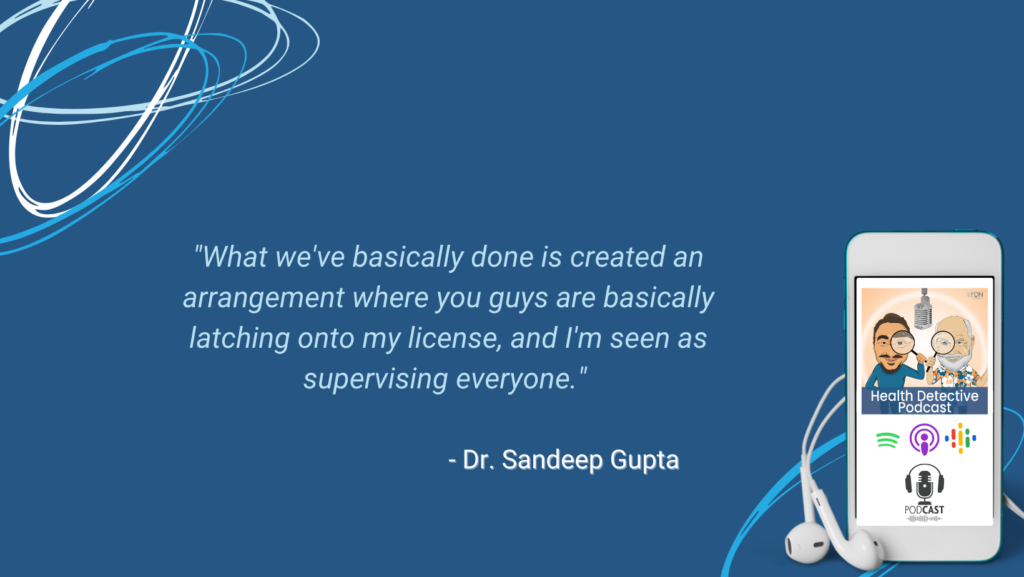
Basically, I am a totally registered MD, so I’m able to run even U.S. labs. What we’ve basically done is created an arrangement where you guys are basically latching onto my license, and I’m seen as supervising everyone. Through the processes we’ve developed and the training, because we quite clearly explain where the limitations are and when referral is needed to a medical doctor, I believe it’s safe for you guys to have access to these labs.
I actually think in some cases it’s more safe because you’ve got clients who are not willing to go to a doctor and you’re able to do a bit of a screen and say, hang on, man. You’ve got a really low hemoglobin there. You haven’t had any blood tests before because you don’t go see doctors. This is a case where you actually really need to see one. Here, let’s go and have a look at who’s actually a really friendly MD in the place you live. Let’s check this out and make sure this pathway is going to be okay for you.
You can lead people down a pathway that otherwise they were afraid to take, but they really need to take. I believe it’s a safe way of operating. Basically, you guys are then able to just run some simple things. For instance, there’s the Cardiovascular Wellness Panel. If someone’s worried about heart disease or they have existing heart disease. We’ve got the CIRS basic panel and the more extensive one.
Dr. Sandeep Gupta Sees the Benefit of FDN Preparatory Work
Now, one of the things about that, let’s say someone has worked out that they’ve got very significant mold problems. Sometimes it can take six months or a year to get into what we call a CIRS Certified Physician. Let’s say, you know, like Dr. Scott McMahon, I mentioned before.

In the meantime, you guys can save them time and energy by having the labs done. So, by the time they get there, they’ve already got some labs done. They’ve already done some preparatory work. They’ve started getting an inspection done. They’ve gone on some basic binder support, et cetera. That’s going to streamline that process so much. I think overall it can be very, very beneficial.
We’ve also got the mental health panels there. There’s a whole range of panels. I actually use it myself all the time with my U.S. clients and it’s a very efficient service. It just gives you guys the ability to compliment the other things you’re doing such as that basic functional testing with some more conventional lab testing. It marries in really well.
For instance, it’s not easy to test the thyroid any other way than doing a blood test. Being able to get those labs back in combination with, for instance, the cortisol results that you generally do and some gut tests. Well, it just gives you a more thorough picture. Through that, you’re able to assist the clients even more.
If the assistance you’re meant to give them is well, actually, you need to go see a doctor, then that’s fine too. They’ll actually totally thank us for that because that’s the right path for them.
Dr. Sandeep Gupta Encourages FDNs to Create a Medical Network
[00:40:45] Detective Ev: Just to be clear then, because I think this was a perfect explanation. When you are doing this, though, even though this is completely legal for us and you, you are still taking some risks so that you are objectively saying that you trust FDN and the certification process enough that you’re going to put your name on this for technically thousands of graduates, in addition to the other medical directors. You are saying that, hey, I trust this enough that I’m going to do that.
[00:41:08] Dr. Sandeep Gupta: Yeah, that’s right.
And I myself have been involved very much in the training at each step explaining to people, hey, you guys just know where your limitations are. Know when the point is where you go, oh, hang on, hang on, hang on. Yep, I can see some medical intervention is needed here.
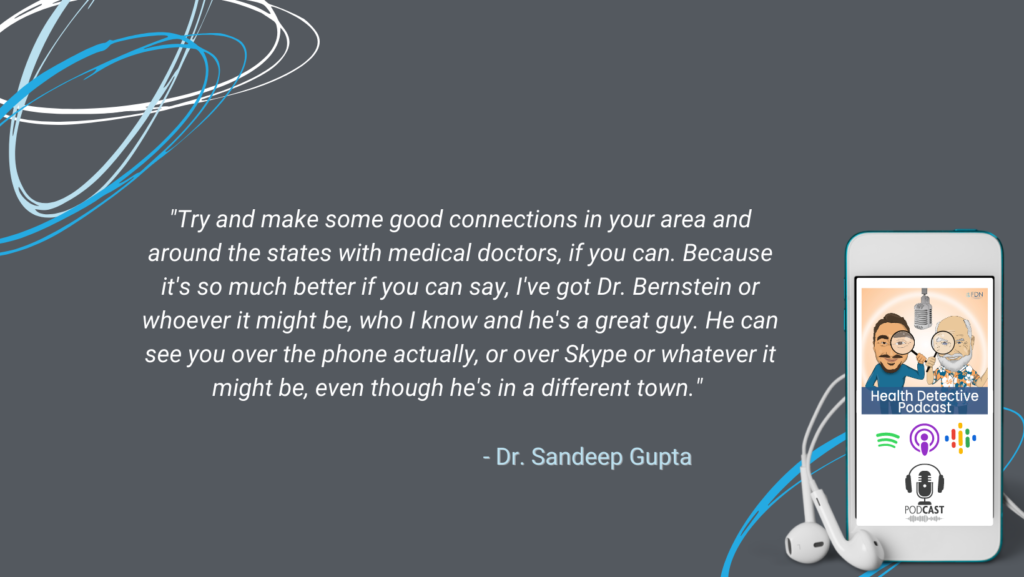
Try and make some good connections in your area and around the states with medical doctors, if you can. Because it’s so much better if you can say, I’ve got Dr. Bernstein or whoever it might be, who I know and he’s a great guy. He can see you over the phone actually, or over Skype or whatever it might be, even though he’s in a different town. I know the guy he’s really cool. He understands what we’re doing, and he can give you all the referrals you need and get some further testing done.
You know that’s the kind of arrangement that works well for everyone, I think. So that’s what I encourage FDNs to do.
The FDN Medical Director Program Runs Smoothly
[00:42:00] Detective Ev: Yeah.
And I know it might seem simple, but I can’t tell you how much that explanation means for the audience. Because I can say it a million times. It means a thousand times more coming from you with your years of experience.
You don’t have to be doing this. You went through the course yourself, and you went through it at an okay time. But let’s be honest, it’s only gotten significantly better since you went through back then. I mean, it’s certainly a different course from then.

I think that says a lot when people are willing to do that, and guess what? We don’t really have many problems. I mean, I’m not in that side of the business. I don’t know of any problems, major ones that we’ve actually had. People go out, we do this work, and we’re trained to do it correctly.
There are times and places that I can really help someone. There’s other times and places where, a basic example, if someone’s occult blood comes back as like an eight on the GI MAP for me, I am referring that to a GI specialist every single time, just to double check.
Then, you know, what’s cool guys? You go there, they double-check it. A lot of the times, it’s nothing. They come back and bam, they can do the rest of the work with you. You keep focusing on that holistic stuff.
But we need to be doing work that incorporates everyone. We need to be having more conversations like this.
Western Medicine & Natural Modalities Need to Work Together
Again, I said it in the beginning, I’ll say this a million times more. If doctors or functional practitioners or both are truly interested in the best results for their patients and clients, then we need to all work together. Otherwise, we’re just letting ego get involved and we’re just fighting each other back and forth. I don’t think that’s really a good idea at all.
Just to be objective, it annoys me just as equally when a functional practitioner is hating on Western medicine as if it’s the worst thing in the world. I think that’s ridiculous. Then I ask them, well is your objective here to get the patient or client the best results possible? Because then you have to use a little bit of both most times and that’s completely okay.
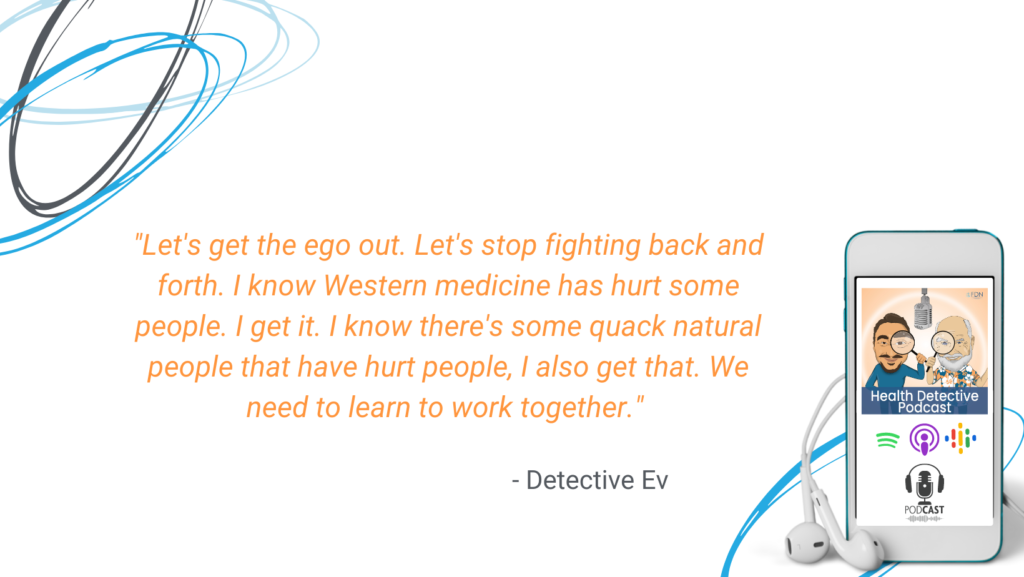
Let’s get the ego out. Let’s stop fighting back and forth. I know Western medicine has hurt some people. I get it. I know there’s some quack natural people that have hurt people, I also get that. We need to learn to work together. There’s really good things on both sides. That’s the future, hopefully.
Now I want to spend the last few minutes. I have a final question for you, but I want to talk about where people can find you, who can reach out. Because you even said that you have U.S. clients.
I actually didn’t know this. You’re taking people in person then and online; I’m guessing as well?
Where to Find Dr. Sandeep Gupta
[00:44:02] Dr. Sandeep Gupta: Yeah, that’s right.
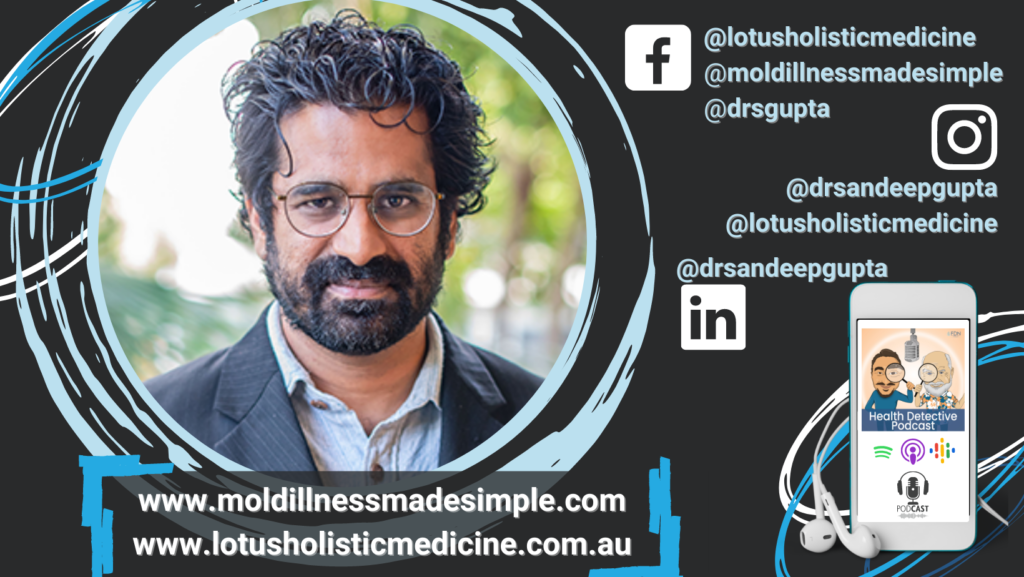
Generally, the people who are U.S. clients are ones who have gone through some of my course material. You can find me at lotusholisticmedicine.com.au. That’s my clinic site.
Then moldillnessmadesimple.com is where you can find my online course on mold illness. It’s roundabout 17 hours. If you guys want to do that, it’s probably a couple months of working a couple of hours a week and you can get through that. It’s a relatively inexpensive course, and it’s a great thing to do in combination with FDN because it just gives you that other small piece, while FDN is kind of the big picture. This is one particular small area which may be useful.
So, there’s those two. Then there’s just, all my links at drsandeepgupta.com. That’s just a small link tree site. Those are my main websites.
[00:44:53] Detective Ev: Okay. Thank you.
And I love how you called it the big piece because that’s so true.
Just to be clear for people. It’s not that we’re specializing in anything as FDNs. We know better than the stuff that you were talking about in the beginning. But let’s not be ridiculous. Some people have interests that outweigh other areas of functional healthcare. That’s perfectly fine.
Some people have niches for the sake of business. You could be doing fundamentally similar things and have a different niche for your business. It’s not the same as specializing. I have the topics I love learning about. Like, light’s a huge one for me. Blue light, red light, all that kind of stuff. Kind of the dangers of blue light and the benefits of red light.
Provided social links:
Facebook www.facebook.com/lotusholisticmedicine, www.facebook.com/moldillnessmadesimple, www.facebook.com/drsgupta
Instagram @lotusholisticmedicine, @drsandeepgupta
LinkedIn linkedin.com/in/drsandeepgupta
Website www.moldillnessmadesimple.com, www.lotusholisticmedicine.com.au
Dr. Sandeep Gupta Offers Online Mold Course That Marrys Well with FDN
I love all those things and I can do that, but I can still do the core, big picture stuff of FDN while doing that. Similarly, I think there’s a lot of people out there, Dr. Gupta, that are very interested in the mold side of things now. I think that’s because unfortunately, I’ve heard devastating stories of people spending tens of thousands, if not hundreds of thousands of dollars, trying to figure out just what is wrong with them. And once they figure it out, there’s another 50 grand. They got to redo the house. They got to spend the money on the health care stuff.

So, I can imagine many people would be very passionate about learning more about that. I’m glad that that can be done with the FDN course.
Now, one question I got to ask you before we head off for sure. My second to last one here is, could you share maybe a client testimonial that’s just maybe very close to your heart or one that really stands out? I know that you’ve worked with many people, but I think that’s one of the best parts about doing these interviews is getting to talk to people who have actually helped others and maybe changed their whole life around.
They came to you and that was it for them. That’s what they needed.
Dr. Sandeep Gupta Tells a Client Success Story
[00:46:24] Dr. Sandeep Gupta: Yeah.
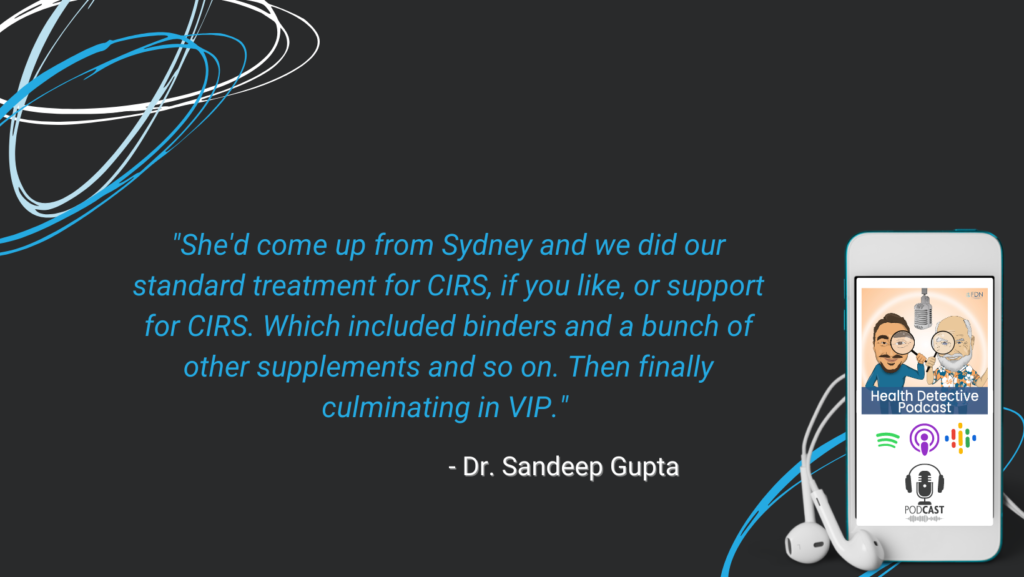
Probably one that comes to mind is one that I presented recently in another presentation. Which is a client who was affected by a mold, a water damaged building, if you like. One, which had a high level of mold and dampness. She’d come up from Sydney and we did our standard treatment for CIRS, if you like, or support for CIRS. Which included binders and a bunch of other supplements and so on. Then finally culminating in VIP.
One of the really interesting things that happened is during that process, she got a lot better, but then a lot of her emotional trauma came up. She started then realizing she needed to work on that. So, she spent a few years really working on some of her emotional trauma from childhood. She did limbic system retraining. She did vagus nerve techniques. She did a whole bunch of other things. Finally, we’re finding that she’s coming good again.
But I think one of the things for me that’s so powerful about that story is it’s not just about that particular illness itself. It’s actually helped her to address like some of the really big picture things in her life. My hope is that her life will be totally transformed after all of this. She’ll have a much more open and deep experience of life. That for me is very exciting. See that there’s a whole transformation that’s taken place.
It’s not just people getting better. That’s only one part of the puzzle. The other part is how much has this changed you and grown you? I love hearing about that.
Health Issues Can Direct Lives to Amazing Places
[00:47:55] Detective Ev: It’s one of those things that just makes this work not really feel like work. It’s one of the coolest paths to get to go down.
I know none of us would choose to have our health issues necessarily. But man, the other side of this, getting into this space, and doing the work that you’re doing now, I’m sure you wouldn’t change it. Right? It’s just one of those things.
I know so many people, especially as a younger guy, a lot of my friends got out of college two years ago. Some of them are graduating with advanced degrees right now, and they’re following a path that might pay very well and might be fulfilling in a sense, but you know, they’re not happy. They’re not doing something that lights them up.

I think that’s my biggest gift. I would never ask for my health issues, but I also wouldn’t go back and change the 13, 14 years of things that I dealt with. Because it made the rest of my life more amazing than I think most people will ever have the privilege of knowing. Just getting to talk to you. Like, oh yeah, this is work, right? I get to interview some cool guy from Australia that helps us out at FDN. Yeah, that’s really work. Right? No, I love all this stuff. I think it’s amazing.
Obviously, we’ll have all of your links in the show notes. I thank you for your time today. Now we will finish up though with the signature question of the Health Detective Podcast.
Health Detective Podcast Signature Question
It’s not a trick or anything. It’s actually kind of simple but depending on the person can be complex in its simplicity. And the question is this, if I can give you a magic wand and you could get every single person in this world to do one thing for their health or stop doing one thing, what is the one thing you would get them to do?
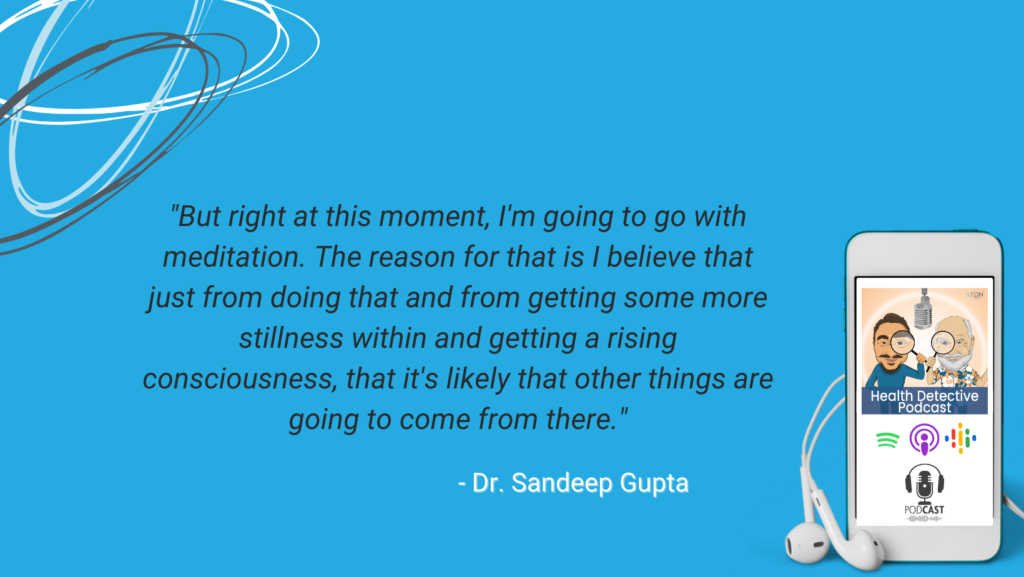
[00:49:18] Dr. Sandeep Gupta: Wow. That’s a great question. To be honest, I’ve never thought about it. But right at this moment, I’m going to go with meditation. The reason for that is I believe that just from doing that and from getting some more stillness within and getting a rising consciousness, that it’s likely that other things are going to come from there.
That’s why I’m going with that rather than saying something like just eliminate gluten or just eliminate sugar, which are of course hugely important. There’s no doubt about it. But I would say if they brought in that one habit of just doing meditation regularly, that it’s likely their consciousness will grow, and they’ll start realizing these other things in due time.
Conclusion
[00:49:57] Detective Ev: I love that Dr. Gupta finished up with the meditation as his number one thing. Especially what he mentioned about consciousness. There are many people that believe that if you got yourself to a place consciousness wise, where you have mastered meditation – you’ve mastered your mind, that you could just heal about anything. You wouldn’t really need any of this other stuff. I haven’t seen that in practice yet.

My gut though, ironically tells me that’s true. But until we figure that out on a mass level, I think the next best thing is the FDN system.
So, if you’re interested in learning more about the course, you can go to fdntraining.com/call and you could talk to one of those course advisors. That’s what I talked about in the middle of the show.
I want to thank Dr. Gupta again for hopping on with us. He hopped on at like 7:30 in the morning his time. That dude, as you guys can tell is pretty darn busy. He’s got a lot going on. I appreciate him coming on here and not only sharing his journey, but also explaining the medical director program to people, because I think that’s something that’s been confusing for many.
We’re looking forward to talking to you guys again soon. But until then, take care.

